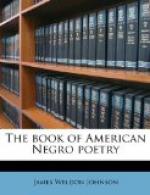The Negro in the United States has achieved or been placed in a certain artistic niche. When he is thought of artistically, it is as a happy-go-lucky, singing, shuffling, banjo-picking being or as a more or less pathetic figure. The picture of him is in a log cabin amid fields of cotton or along the levees. Negro dialect is naturally and by long association the exact instrument for voicing this phase of Negro life; and by that very exactness it is an instrument with but two full stops, humor and pathos. So even when he confines himself to purely racial themes, the Aframerican poet realizes that there are phases of Negro life in the United States which cannot be treated in the dialect either adequately or artistically. Take, for example, the phases rising out of life in Harlem, that most wonderful Negro city in the world. I do not deny that a Negro in a log cabin is more picturesque than a Negro in a Harlem flat, but the Negro in the Harlem flat is here, and he is but part of a group growing everywhere in the country, a group whose ideals are becoming increasingly more vital than those of the traditionally artistic group, even if its members are less picturesque.
What the colored poet in the United States needs to do is something like what Synge did for the Irish; he needs to find a form that will express the racial spirit by symbols from within rather than by symbols from without, such as the mere mutilation of English spelling and pronunciation. He needs a form that is freer and larger than dialect, but which will still hold the racial flavor; a form expressing the imagery, the idioms, the peculiar turns of thought, and the distinctive humor and pathos, too, of the Negro, but which will also be capable of voicing the deepest and highest emotions and aspirations, and allow of the widest range of subjects and the widest scope of treatment.
Negro dialect is at present a medium that is not capable of giving expression to the varied conditions of Negro life in America, and much less is it capable of giving the fullest interpretation of Negro character and psychology. This is no indictment against the dialect as dialect, but against the mould of convention in which Negro dialect in the United States has been set. In time these conventions may become lost, and the colored poet in the United States may sit down to write in dialect without feeling that his first line will put the general reader in a frame of mind which demands that the poem be humorous or pathetic. In the meantime, there is no reason why these poets should not continue to do the beautiful things that can be done, and done best, in the dialect.
In stating the need for Aframerican poets in the United States to work out a new and distinctive form of expression I do not wish to be understood to hold any theory that they should limit themselves to Negro poetry, to racial themes; the sooner they are able to write American poetry spontaneously, the better. Nevertheless, I believe that the richest contribution the Negro poet can make to the American literature of the future will be the fusion into it of his own individual artistic gifts.




